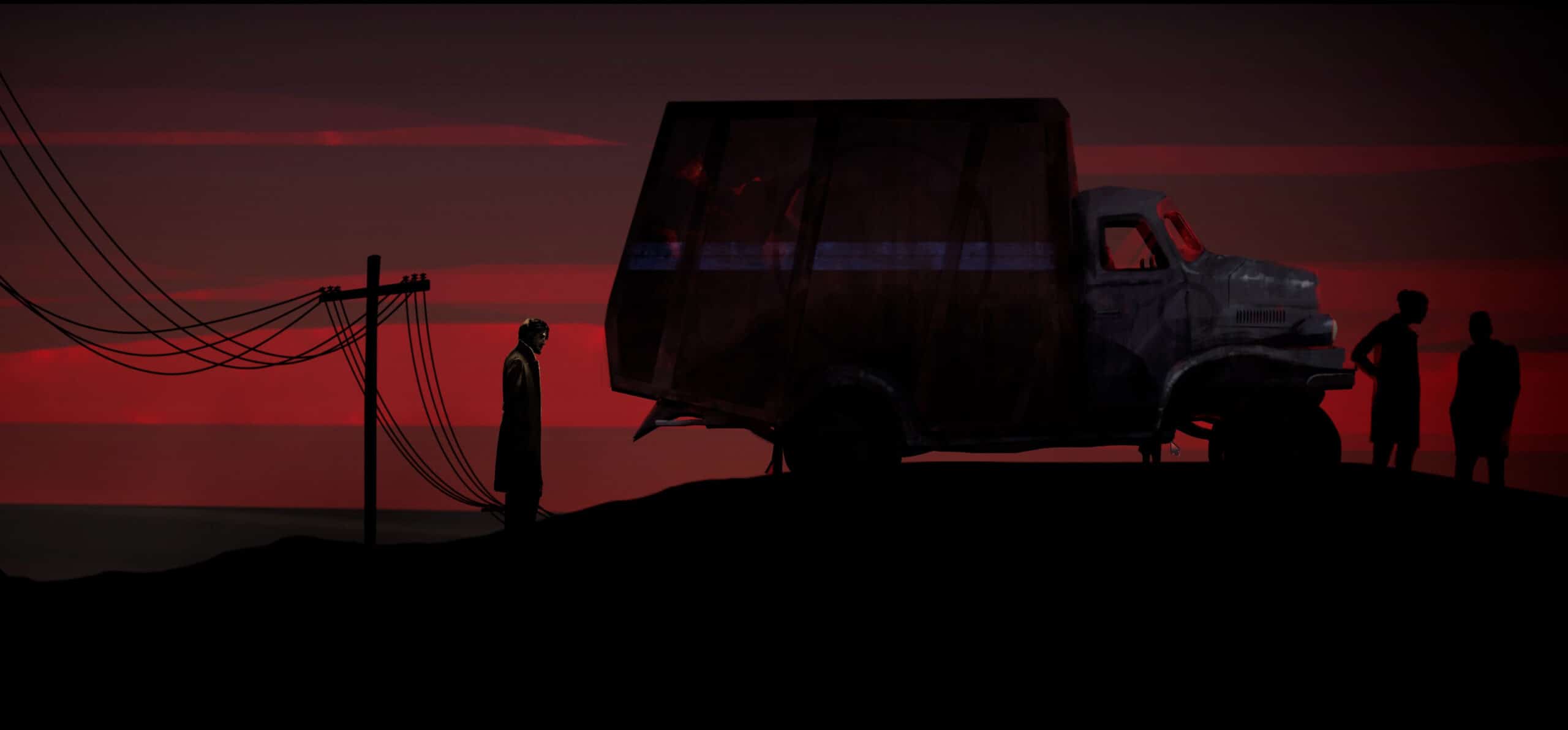I received a free review copy of this product from https://keymailer.co.
As an independent reviewer, this does not influence my opinion of the game.
We’ve all been there. Waking up at an unknown train station in the early hours of the morning (or evening), not knowing exactly where you came from, or even if you’re still asleep.
Okay, not really, but there’s a dreamy quality to GRUNND that draws from the Eastern European surreal and absurd literary movements, and having finished the game, I’m not sure I’ve woken up yet.
GRUNND is a short PC point and click mystery game with science fiction elements. And while Kafkaesque is an overused description for anything bordering on the inexplicable, GRUNND is most definitely a game for Kafka fans.
GRUNND’s story
GRUNND’s story follows an unnamed Hero who wakes up on a train station in a place he’s never seen before. He struggles to get answers from any of the bizarre characters that inhabit this desolate purgatory. All he wants is a place to rest his head, but it seems that’s too much to ask.
It’s beneficial to think of the game as an interactive story or audiobook. Quests revolve around dialogue with the strange inhabitants of Bytown, although there is one particularly challenging gateway puzzle that took me a while to figure out. You’ll find yourself talking to small children, then to strange creatures trapped in a wall, then to disaffected bar staff. You’ll probably want to take the whiskey as it’s offered.
Mr Cleese was my favourite exchange of dialogue, which drew most heavily on the absurd literary (and comedic) movements. I wished some exchanges had been pushed further for humour or horror, but they certainly left me with the uneasiness of the game’s world.

As a writer, one thing I admire about GRUNND is how invisible the branching narrative is. Because of the unexpected nature of the story, there are no flags which say, “You are making a choice, make sure it’s the right one.” I appreciate that – too often as gamers we’re induced to making ethical judgements in games, and punished for exploring choice. Here, you’re not sure if you’re solving a problem or creating new ones.
There is a lot of reflective walking through this beautifully hand-drawn world. The painterly artwork is one highlight of the game. The narrator’s voice acting keeps you company through these long stretches, although his melancholic voice offers little comfort. Some gamers might struggle with the pacing here; I found myself more engaged as the story went on, but as I enjoy experimental narratives, I was willing to give GRUNND the benefit of the doubt.

There are things that will be left unexplained well after you finish the game. I wanted to know more about the science fiction elements; the towers that reference Norse mythology, the creepy trash collectors, or even figuring out the purpose of the Farm. I’m not sure whether you got more of an explanation depending on the choices you make in the story, but clearly I made some interesting life choices!
While GRUNND’s ending is signposted by the characters, the game ends abruptly with narration over the title screen. This could be improved by adding some extra animation or graphics appropriate to each ending, then running a credits sequence, rather than returning the player to the load screen. Without exploring other choices (see note on Save Games below), I’m unable to say whether different endings have more extended conclusions.
GRUNND’s gameplay
While GRUNND’s narrative intrigued me, there are several issues with the gameplay that stymied my experience as a player. But they’re very fixable, and if they’re fixed, it would significantly improve the quality of gameplay. Given the game was produced by a tiny team, mostly by a single person, my intention is that this feedback would be useful, rather than highly critical.
For me, the UX is the biggest issue in fully engaging with the game. Despite the addition of bubbles to show interactive elements, when I right-clicked on these, sometimes nothing happened. In parts, I had to click around the area a bit to get the interaction working. Sometimes the bubbles remained even after a dialogue tree had been exhausted and there was nothing more to say.
One of the most frustrating points was trying to get out of a boat – the leave boat button was moving with my boat and would then disappear when the boat stopped at the dock. A lot of frantic clicking got me out, but this could be fixed with a bigger button that remains on screen when the boat stops.

A few other issues:
- The timing between dialogue choices and the character’s reaction was a little slow.
- The dialogue screen didn’t always scroll down to where I was at in the dialogue.
- There are also a couple of typos in the inventory items – easily fixed in a patch.
- I also noted that the developer is adding a Save Game function, which would really help those of us who like to explore choices in games (especially at the end)!
With a little more funding, I would also look at using a readable font in the dialogue boxes that matches the style of the game (perhaps a serif rather than what I think is Arial). Additional animation on Bytown’s strange characters would also add to the player experience.

Conclusion
I felt uneasy as I left GRUNND, and that’s no bad thing. The game achieves its vision of surrealism, in an akimbo, off-kilter world that will leave you wondering what just happened.
For gamers who demand certainty, GRUNND is not for you. For those of us who dig the weird and inexplicable, GRUNND is a short, surreal experience that’s worth exploring for the seamless way it integrates branching narrative. And with a few technical tweaks, it could become an even better game.

Share your thoughts